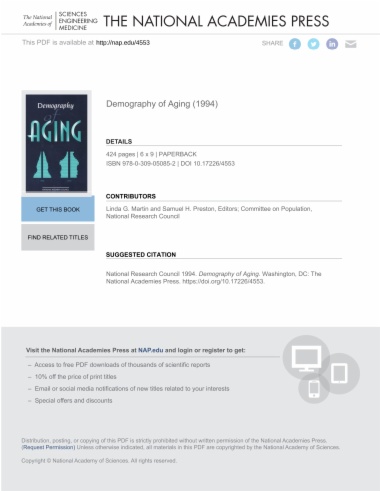As the United States and the rest of the world face the unprecedented challenge of aging populations, this volume draws together for the first time state-of-the-art work from the emerging field of the demography of aging. The nine chapters, written by experts from a variety of disciplines, highlight data sources and research approaches, results, and proposed strategies on a topic with major policy implications for labor forces, economic well-being, health care, and the need for social and family supports.
- Cover
- Front Matter
- 1 Introduction
- 2 The Formal Demography of Population Aging, Transfers, and the Economic Life Cycle
- 3 Retirement and Labor Force Behavior of the Elderly
- 4 Income, Wealth, and Intergenerational Economic Relations of the Aged
- 5 The Elderly and Their Kin: Patterns of Availability and Access
- 6 Care of the Elderly: Division of Labor Among the Family, Market, and State
- 7 Medical Demography: Interaction of Disability Dynamics and Mortality
- 8 Socioeconomic Differences in Adult Mortality and Health Status
- 9 Geographic Concentration, Migration, and Population Redistribution Among the Elderly
- 10 Research on the Demography of Aging in Developing Countries
- Appendix: Letter to Richard Suzman of the National Institute on Aging from the Committee on Population, March 2, 1993

